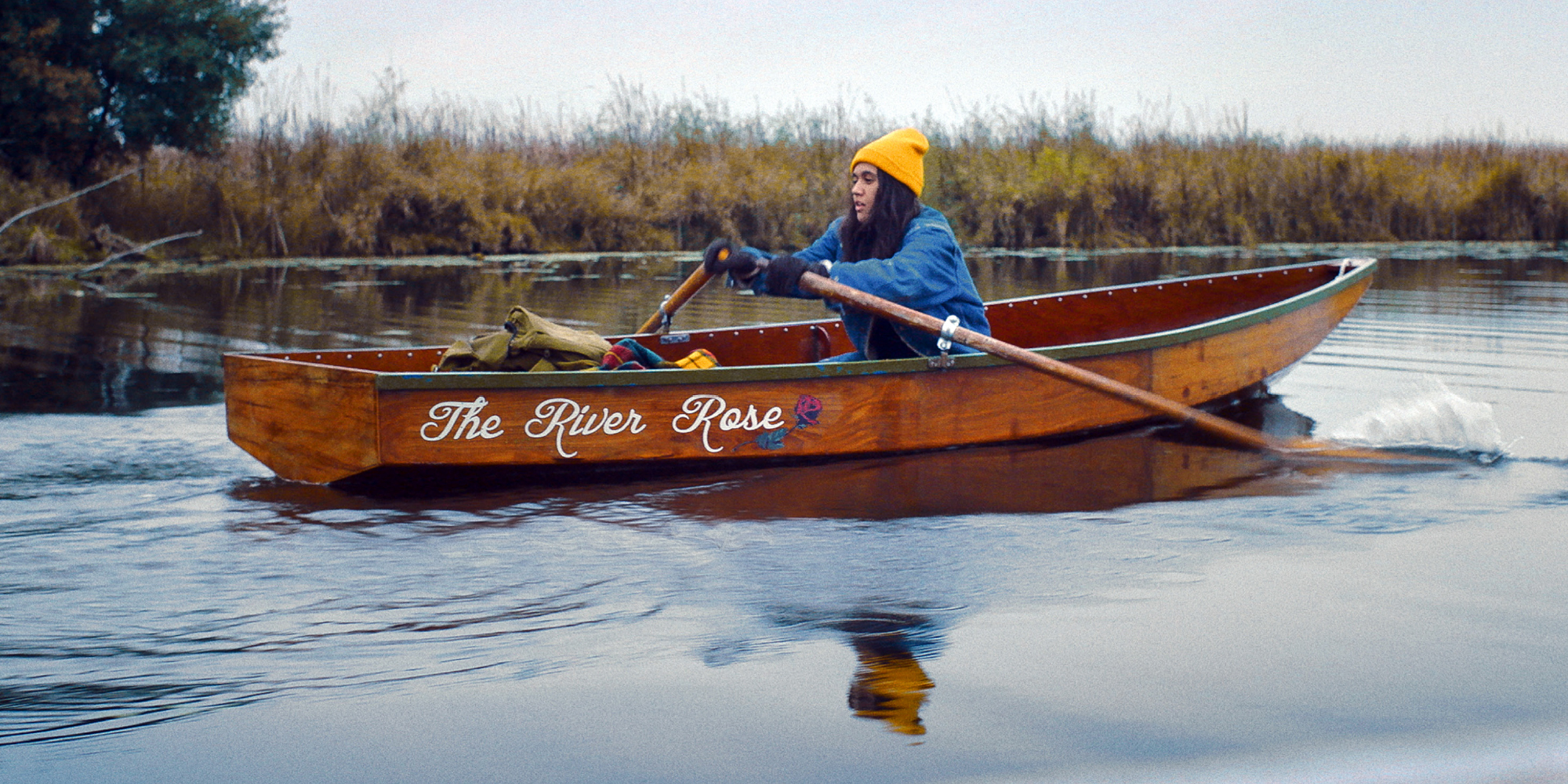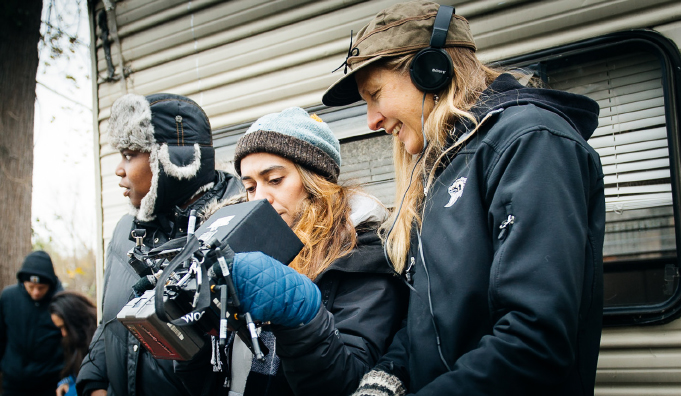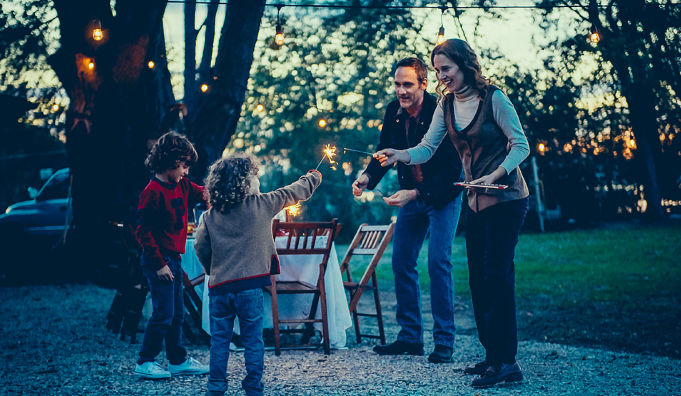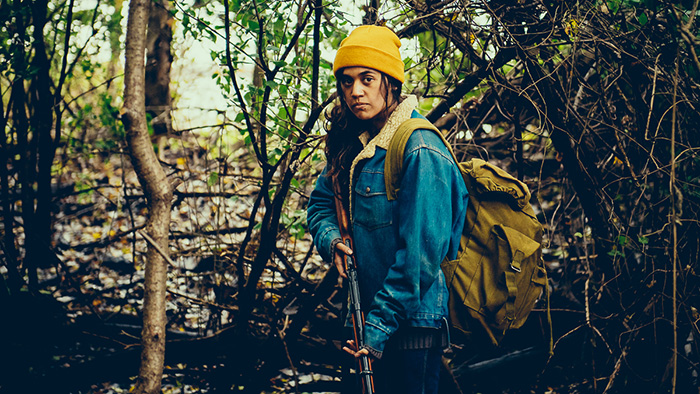
Margo Crane, the protagonist of Bonnie Jo Campbell’s (AB’84) novel Once Upon a River and Haroula Rose’s (AB’02, MAT’02) film of the same name, journeys down the fictional Stark River. (Photography by Daniel Klutznick)
Haroula Rose, AB’02, MAT’02, put the work of Bonnie Jo Campbell, AB’84, on the big screen. Last fall the two brought the film to Chicago.
There are too many people at the front and not enough microphones to go around. “That’s OK,” Bonnie Jo Campbell, AB’84, bellows, her voice easily carrying to the back row of the theater. “I don’t need one.”
On a rainy Monday afternoon in October, the theater at AMC River East—the venue for the Chicago International Film Festival—is three-quarters full. We’ve just watched the Chicago debut of Once Upon a River, a film adaptation of Campbell’s book of the same name, written and directed by Haroula Rose, AB’02, MAT’02. (The film is currently on the festival circuit; by early 2020, it had won 14 awards at 25 festivals.) Rose, Campbell, and several members of the film crew have lined up along the screen to answer questions.
Once Upon a River (W. W. Norton, 2011) tells the story of Margo Crane, a quiet, beautiful teenage girl, abandoned by her mother, who is then sexually assaulted by her uncle at a family party. A year later, Margo takes revenge on him at another family gathering: as Uncle Cal is relieving himself, she carefully aims and shoots him, leaving him wounded.
Campbell first explored that narrative in “Family Reunion,” a story in the collection American Salvage (Wayne State University Press, 2009). The details differ slightly, as does the name of the teenage girl, Marylou Strong. The story ends just after Marylou wounds her uncle: “She closes her eyes to lengthen that perfect and terrible moment and hold off the next, when the air will fill with voices.”
Once Upon a River is the tale of what happens after that. Uncle Cal is shot at the end of chapter three (which closes with a near-identical sentence to “Family Reunion”). During the confusion, Margo’s father is shot dead by her cousin Billy. Margo, blaming herself for her father’s death, runs away.
The book opens with a map of the Stark River—an imaginary tributary of the Kalamazoo River in southwestern Michigan—showing where Margo hides during her wanderings: the marijuana house, Brian’s cabin on stilts, Pokagon Mound picnic area. A sure shot with a rifle, she survives by hunting, fishing, and sheltering with men who take her in.
Before reading Once Upon a River I asked a well-read friend what he thought. “That book messed me up,” he said. It messed me up too. When a pregnant Margo—whom I’d come to care about deeply—feels so exhausted she lies down in the snow, I found myself saying, “Oh no, no no no” out loud. Talking to Margo or to Campbell, I’m not sure.
Watching Rose’s film, I felt snagged on my own mental adaptation of Campbell’s book. Significant characters are cut out. Sometimes actors bluntly state things that Campbell took pages to build up to and hint at. (One favorite line from the book did survive: “I just can’t get enough of a girl who don’t talk.”) In the book, Margo forms quick, intense relationships with the men she meets by chance along the river; in the film, logical explanations are given for how this is possible.
Like the book, the film is a love letter to the subtle beauty of rural Michigan. At the screening, the moderator’s first question for Rose is about nature, which he sees as “a character in the film.”
“I’m glad that came through,” says Rose. Her voice is high and sweet and, despite the handheld microphone, soft. “I wanted it to feel like you’re really in her shoes—that it’s always a subjective experience.”
“Could you talk a little louder?” yells a woman from the audience.
“Oh! Yeah,” says Rose. “Charlotte, my cinematographer—any time there was anything happening within the environment we were in, we would just shoot it.” The film is punctuated by these contemplative B-roll moments, when we see the wild or domestic creatures that live along the river—what Margo is seeing. “It felt like we were trying to be National Geographic photographers at times.”
The next question is for Campbell: Was Rose true to the story?
“Can you even believe this movie?” Campbell says, as enthusiastic as she is loud. “The movie does everything that I hoped to do in the book. … It’s not the book, and that’s fine.”
Another woman in the audience asks about the title, which “conjures up a fairy tale,” she says. “Is that what you were aiming for?”
“I liked the double meaning of it, that it’s literal and metaphorical,” says Rose. “I didn’t think there was a choice to change it. I really loved the title.”
Actually, Campbell points out, her original title was “Margo Crane,” after the name of its main character: “That’s what I wanted it to be.”
“I didn’t know that!” says Rose.
“See, we have to have more drinks together,” says Campbell. “American books that are about mythic characters are called by the character’s name—Huck Finn, Tom Sawyer.” But her publisher did not agree.
“I was a little angry in my heart,” Campbell says. “I wanted Margo to have that mythic element.” But she made her peace with Once Upon a River. “It allowed me to make the story a little more fantastical.”

The strange thing about Margo’s wanderings—inspired by both Huckleberry Finn and the Odyssey—is that she doesn’t really go anywhere. Along the Stark River she meets one random man after another, all the while traversing well-known territory. The relationships are the equivalent of the monsters Odysseus has to battle, Campbell says: “The men come and go and Margo remains. I don’t know if people are used to the woman remaining.”
Rose (whose given name is Haroula Rose Spyropoulos) came across Once Upon a River by chance too, in the pages of the University of Chicago Magazine. The Nov–Dec/11 issue included a short article about Campbell, written by Christina Pillsbury, AB’14, then a Magazine intern. Campbell had just won a Guggenheim Fellowship.
“What I remember most was Bonnie Jo’s picture,” Rose says. We’re sitting at a table in the Andersonville bookstore Women and Children First, chatting before a promotional event later that evening. “She looked like she has some things to say.”
Campbell laughs explosively, as she does often. “Were you judging a book by its cover?” A different metaphor comes to my mind: “You swiped right on Bonnie?”
“Well, it was a little deeper than that,” Rose says. “After looking at so many actor headshots, I can tell who’s interesting and who’s not. … I don’t know how bad that sounds, but I’m usually right.” Rose immediately ordered a copy of Once Upon a River (“In hardback?” Campbell chides. “You don’t have the money for hardbacks.”), read it, and read it again.
Rose’s career has had its own meandering path: she went to Spain on a Fulbright, attended film school at the University of Southern California, made several successful folk records and licensed her music, and helped produce films such as Fruitvale Station (2013). She’d been searching for something to make into her first feature-length film. Here it was.
Rose visited Campbell in Michigan in the fall of 2013. “I remember it was kind of chilly,” says Campbell, “and we were at the river”—the St. Joseph River, upon which the fictional Stark is based. Rose may or may not have had a man with her. “She brought a guy, and she swears she doesn’t remember,” says Campbell. “I remember it was a pretty good-looking guy.”
“Really?” says Rose. “Interesting.”
“Guys always show up along the river, if you noticed in the story,” says Campbell. “I also thought you looked hungry.” She means literally hungry, not ambitious hungry. “I’m a person who always has some food with me. Even now, I’ve got some food. … I remember, I thought I should feed you.”
“I don’t remember hunger, and I don’t remember the guy,” Rose says. “I do remember us having this really cool thing where we were finishing each other’s sentences very easily without interrupting. I felt like we were seeing eye to eye on how to treat the subject matter and the character.”
It was the character of Margo that attracted Rose so strongly. “I could just see some things about me in her,” she says. “Then the logistical brain was like, oh, I’ll get to learn about guns, and sex on camera, and boats, and a period piece” (the novel is set in the late 1970s) “and just make it really hard for myself.”
The hardest part, it turned out, was finding someone to play Margo. When Rose read the book, she understood Margo to be Native American, something Campbell had implied but hadn’t stated overtly. Rose wanted to find a young Native American actor who could express all of Margo’s emotion with very little dialogue. At the eleventh hour—when all the other roles were cast—Rose found a near-unknown performer, Kenadi DelaCerna.
But why would Campbell allow her book to be made into a movie at all, when film adaptations can be so terrible? “You know what, I don’t have any children,” Campbell says. (In a talk archived on her website, Campbell urges aspiring writers to think about what they might have to sacrifice for a writer’s life: a nice house, travel, a family. “Say this aloud: ‘I will live a literary life. I read books and write.’ Repeat daily as needed.”) “What I have are my books,” she continues. “And if my books are my children … what a foolish thing to keep them to yourself, exactly as you created them. Isn’t it better to have your children grow up and go into the world and know other people and change?
“Haroula actually did a few kindnesses to Margo that I didn’t do,” Campbell adds. “That was really nice of Haroula to not make her kill Paul.” Paul and his brother Brian loom large in Campbell’s version of Margo’s story; in Rose’s, she meets them only in passing.
“I did have a scene where she shot him, and it just didn’t fit,” Rose says. “When I took it out, she was a lot more sympathetic.”
“That was a beautiful scene,” says Campbell. “I got to see that scene.” In the book, Campbell sets up the murder so it seems unavoidable; Margo is protecting a man she loves, a gentle man who doesn’t understand the danger he’s in. “She had no choice.”
That man, and their relationship, are left out of the film entirely. “I saw the screenplay at a couple different points. When I first saw it, I was in the head of the book, so everything that was different stood out,” says Campbell. “I learned the difference between a movie and a book.”

“It’s very unusual for a novelist to love the film,” Sheryl Johnston, Campbell’s publicist, remarks as we’re waiting for the Women and Children First event to start. It’s been billed as an “author conversation” between Campbell and Rose. Rose is also scheduled to perform several of her songs, including the one that ends the film.
We’re sitting in the children’s section, where four rows of folding chairs have been lined up. Rose’s parents are in the back row, next to Bonnie’s aunt and uncle, Kathy and Terry Herlihy; with his weathered face and flannel shirt, he looks like he walked straight off the film set.
Campbell is chatting with a burly gray-bearded man who’s brought his mother along. It’s H. B. Ward, who has a few lines in the film; he plays Margo’s mother’s ex-boyfriend. “You really cried at the movie?” Campbell asks. He did.
By 7:30 all the chairs are full. Linda Bubon, one of the store’s owners, introduces Campbell and Rose, as Rose softly strums her guitar. Bubon saw the movie yesterday, she says, “and I can’t get the characters and the images out of my head.”
Rose plays a song called “Moon and Waves,” her gentle voice filling the room. Afterward, she tells the audience about a screening at Efebo d’Oro, an Italian festival dedicated to film adaptations of literary works. Once Upon a River won its top prize.
“Were there any comments about the rural poverty that you show?” Bubon wants to know.
From the back, Campbell’s aunt Kathy speaks up: “I think the beauty of the nature scenes in there kind of cancels out that it was so poor.”
“Well that’s interesting,” says Campbell, “because so much of what I’m trying to do as a writer is bring dignity to places where— Most people would just scoff at the kind of people I write about.”
“There’s this question of, where is she poor and where is she rich?” adds Rose. When Margo finally finds her mother, she’s living in a fancy lakefront house. By using harsh, clinical lighting, Rose makes the space seem soulless. “Where there is all this wealth, she’s actually poor.”
“The way you directed this scene is so beautiful,” says Bubon. Margo’s mother is polite but heartbreakingly distant. “She’s a tender teenage girl and there’s no hug.”
“Yeah, my folks got really baffled by that,” says Rose. “They’re like, no hugs?” The audience is laughing. “No kisses? They’re from Greece.”
The discussion turns to the flawless late-1970s look of the film, complete with a vintage police car and the $20 bills then in circulation. Campbell’s aunt asks about the location. “My dad was the one who said, if you’re looking for the late ’70s and you need this rural town,” Rose says, “you should check out Antioch.” The northern Illinois town is near the Chain O’Lakes. “He’s the one who turned me on to it.”
Bubon asks Rose to play another song. “Dad’s favorite,” Rose says. “‘Margo.’” As she begins to sing, her father listens intently; her mother shoots a video on her phone.
“Your home is on the water
You are the river’s daughter
Now that you’ve learned how to kill,
Can you ever be still?”
“The killing part doesn’t make sense anymore,” Rose says in a quiet aside to Campbell, meaning now that Paul’s murder has been cut out.
“She kills the animals,” Campbell points out, kindly.
Though the song was inspired by the book, it isn’t in the film either. “It didn’t fit,” says Rose. “You have to kill your darlings sometimes.”
“Haroula?” It’s Campbell’s uncle. “How did you guys teach— You said you interviewed Margo, or the actress, in New York City. How did she get so proficient with firearms?”
“She joined a rifle club right when she got the part,” says Rose, who had firearms training herself.
“That was part of the deal” with Rose, says Campbell. “You can’t make this movie unless you learn how to shoot.” She changes the subject, asking Rose, “Are you going to try to play ‘Rachel’s Song’?”
“I was hoping you could read the beginning of the book,” Rose says. Campbell laughs.
“Who’s Rachel?” someone in the audience wants to know.
“You don’t have to know it, but it’s the song at the end of the movie that we all cry through,” says Campbell. “I’ve seen the movie six or so times, and I still cry every time.” Rachel is Margo’s unborn daughter, and one of the characters in Campbell’s book Q Road (Scribner, 2002). Once Upon a River “is technically a prequel,” adds Rose.
Campbell pushes round tortoise-shell glasses from the middle of her nose up to her eyes. “The Stark River flowed around the oxbow at Murrayville the way blood flowed through Margo Crane’s heart,” she reads aloud. “She rowed upstream to see wood ducks, canvasbacks, and ospreys and to search for tiger salamanders in the ferns. … Her feet were toughened against sharp stones and broken glass. When Margo swam, she swallowed minnows alive and felt the Stark River move inside her.”
As Campbell reads, my eyes wander the wall of books behind her: Sunny Day; Make Way for Ducklings; I Want a Dog; Hello, Crow!; What Is a Refugee? Off to the side, a point-of-sale display declares, “There’s magic in the pages you read.”
“The way I started that book is not how you’re supposed to,” Campbell says as Rose re-tunes her guitar. “You’re supposed to start books with the action, so everything I was taught I had to unlearn to write that.”
In the scene where “Rachel’s Song” plays, Margo is alone, heavily pregnant, floating on her back in her beloved river. It’s hard to explain, but something about her contented solitude, the sparkling water, and Rose’s angelic voice make the scene profoundly moving.
It’s a happy ending, sort of. Or is it?
“With her carrying a child, I do think that’s the perfect ending,” Rose said during our interview earlier. “The unfolding of womanhood, motherhood, the future, whatever all of those things mean. It’s dark and beautiful—”
“And scary,” Campbell added. “We’re scared for her.”
As Rose begins to sing, the burly actor—the one who cried when he saw the finished film—reaches over and takes his mother’s hand. He doesn’t let go until the song is over.

A few days later, on a Saturday at noon, Once Upon a River screens for the third and final time at the festival.
This time, having been tipped off, I spot Campbell in her cameo, buying minnows in the background of the bait shop. I laugh again at Smoke (played by John Ashton, unrecognizable from his best-known role in Beverly Hills Cop), the cranky old man Margo meets toward the end of her journey. The music, especially now that I’ve heard it a few times, is transporting. I’m able to see the film as its own beautiful thing, with its own integrity, not a pared-down version of the book.
Rose, Campbell, and several actors—including the star, Kenadi DelaCerna—are here for today’s Q&A. As they make their way toward the front, Rose explains again why she chose Campbell’s book: “I fell in love with the way she puts words together,” she says. “There’s something kind of magical about the world.”
The moderator turns to DelaCerna, who’s making her film debut. “I read the screenplay, and then I read the book three times,” she says. “As soon as I read it, I knew I wanted to do it.” Margo was the reason. “There’s this quiet loudness about her that was just screaming from the page.”
“This might be a good moment also to acknowledge that filmmaking is never a solo effort,” Rose says. She asks the producers and crew members to stand up. She names the musicians who contributed songs: Zac Rae of Death Cab for Cutie, Bonnie “Prince” Billy, Rodney Crowell. She credits her father again for suggesting Antioch.
“Is that a hand up for a question?” asks the moderator. “The young man right there in the back?”
A tiny voice squeaks out a question. The moderator repeats: “What was the hardest scene to film?”
“Thank you, Peter. That’s a great question,” Rose says to the child, as sweetly as a kindergarten teacher. The crowd laughs.
“We have the two sparkler boys in the audience,” Rose explains. More laughter from the room, mixed with “Awwww.”
It’s a brief, poignant scene early in the film. Uncle Cal’s young children are waving sparklers at the family party, while Margo—alone, excluded from the family, while Uncle Cal remains—looks on.
The hardest scene to film, as Rose explains in a minute, came soon after the sparkler scene, when Margo’s father is shot dead. Shooting scenes are difficult, and the fact that the shooting occurs at night made it even more technically challenging.
But before she answers, Rose says to the boys, “Can you stand up?”
They do, and receive a warm round of applause. In the world of Once Upon a River, even the sparkler boys get their moment to shine.
Read an interview with Campbell, “What Does Bonnie Jo Campbell Think of Her Reviews?”
Updated 09.30.2020: Once Upon a River is now showing in person in select cities. It’s also streaming, in conjunction with independent cinemas nationwide, starting October 6. See the full list of theaters.
